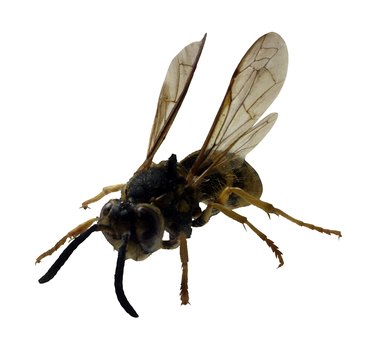Things You'll Need
Protective clothing
Bee veil
Liquid insecticide
Dust insecticide
Pyrethrin natural insecticide

Wasps and yellow jackets eat other pests and can be beneficial to your garden. When they get too close to your home or deck, however, they pose a health threat due to their painful stings. Wasps, foraging for wood to make their nests, frequently chew on decks. Yellow jackets visit your deck to feed on human food. These insects can sting repeatedly, so use precaution when eliminating them.
Step 1
Locate the wasp or yellow jacket colony and mark its location. Wasps build a paper nest in protected places such as under eaves or beneath a deck. Similar to wasps, yellow jackets build comb nests enclosed in a paper envelope with a single entrance hole. Yellow jackets usually nest in the ground, but they sometimes select protected areas such as wall cracks or under timber landscaping.
Video of the Day
Step 2
Wear protective clothing including long pants, long sleeves, shoes, socks, gloves and a bee veil. Use caution when approaching wasp and yellow jacket nests, because they can become aggressive and attack.
Step 3
Spray the nests at night using a pressurized, liquid insecticide that can reach up to 20 feet. Approach the nest slowly and do not shine a flashlight directly at the wasps. For hard-to-reach yellow jacket nests, dispense several puffs of Sevin or Ficam dust with a hand duster.
Step 4
Check the nests the next day for any activity. Treat again if wasps or yellow jackets remain. Once the insects die, remove and dispose of the nest if possible to discourage future wasps.
Step 5
Spray your deck and surrounding areas with pyrethrin to discourage wasps and yellow jackets from returning.
Warning
Wasp and yellow jacket stings can be life threatening to people allergic to the venom. Call a professional exterminator for large or hard-to-access nests. Follow all instructions when using and disposing of pesticides.
Video of the Day